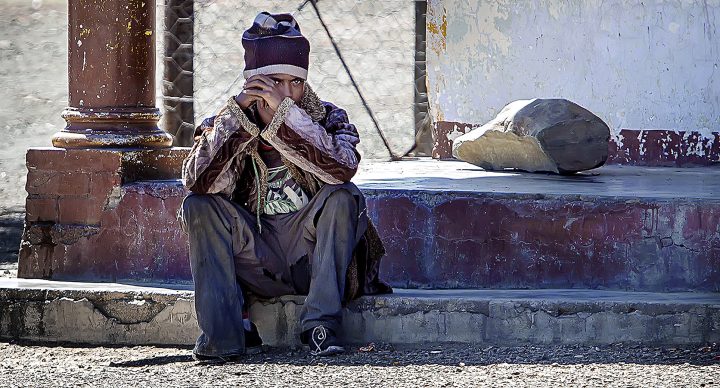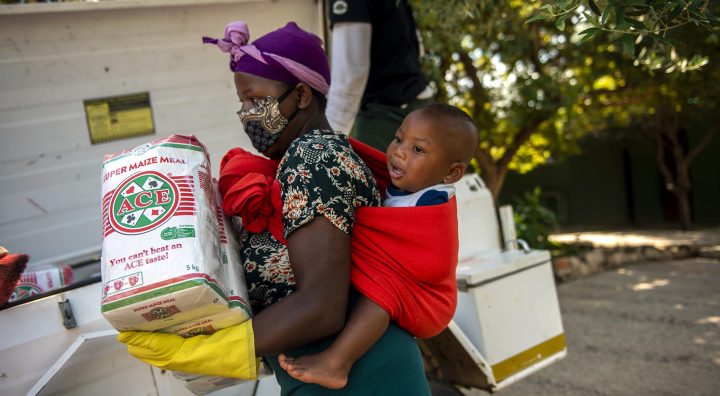In the week leading up to the tabling of the medium-term budget policy statement, expectations were high that addressing the impact of poverty and inequality would feature strongly.
Sadly, this was not the case.
Instead, we got what we always get — the request to be patient, to stick to the dream of a primary account surplus, and then maybe we can make the investments needed to implement expanded social security and invest in strengthening the health system. So, Finance Minister Enoch Godongwana’s maiden budget speech this week translates into the trite “but until then, let’s just do more with less”.
Granted, budgets on their own do not solve structural issues, but they do provide some insight into the government’s plans for addressing its broader developmental priorities.
Hinting at these developmental priorities in respect to healthcare is South Africa’s commitment to achieving Universal Health Coverage (UHC) by 2030. South Africa is a signatory to the UN Sustainable Development Goals. A recent publication assesses South Africa’s progress towards UHC using routine health information. The UHC tracer indicators are categorised into four categories: infectious diseases; reproductive, maternal and child health (RMCH); non-communicable diseases, and service access. South Africa’s performance against these targets was assessed for the period 2008 to 2017 and showed that progress towards effective coverage on most targets remains woefully poor, with just 56% coverage.
Doing more with less: The current context for this budget
The government invested heavily in mitigating Covid-related risks by implementing several regulations, such as alcohol bans to reduce the impact of trauma-related injuries on the health system, along with significant budget allocations for vaccines.
 In the week leading up to the tabling of the Medium-Term Budget Policy Statement, expectations were high that addressing the impact of poverty and inequality would feature strongly. Sadly, this was not the case. (Photo: Donna van der Watt)
In the week leading up to the tabling of the Medium-Term Budget Policy Statement, expectations were high that addressing the impact of poverty and inequality would feature strongly. Sadly, this was not the case. (Photo: Donna van der Watt)
It is important to be reminded that there have been more than 265,000 excess natural deaths between March 2020 and November 2021. This is almost three times more than the official number of Covid-19 deaths, at around 89,000.
While necessary, Covid-related restrictions also had some unintended consequences, as shown in the NIDS-CRAM Study on the unintended consequences of Covid-related restrictions on access to routine health services. The findings, among others, showed a drop in clinic visits, HIV testing, immunisation of children and contraceptive uptake, as well as reduced reproductive health access.
The report warned that “negative consequences may unfold over an extended period if interventions to ‘catch up’ are not urgently prioritised and closely monitored”. Correcting these disruptions to routine health services will require careful and targeted planning, but, importantly, also resources.
Added to this, we saw the impact of the inefficiencies of South Africa’s parallel health system across the Covid cascade. Surveillance reports published by the National Institute for Communicable Diseases reported that between March 2020 and March 2021 over 50% of Covid tests were done in the private sector despite only 15% of the population enjoying private medical scheme coverage. Over the same period, hospital admissions also showed a bias towards private sector admissions with more than 40% of Covid-related admissions occurring in private facilities. Official Covid deaths also appeared higher in public health facilities, often as a result of delayed seeking of care.
Unmet expectations and budget cuts
Considering all of this, there was a genuine expectation that the government would seize the moment and make the necessary investments to prioritise and improve access and responsiveness to quality healthcare. Instead, the budget proposed further cuts to an already collapsing health system.
Health is a shared competence between national and provincial health departments, meaning that while the national department is driving issues such as health policy, provincial health departments are the implementing agents. Delivering healthcare services is a provincial function that is funded from the provincial equitable share. Over the next three years, however, this crucial funding allocation is reduced. Health allocations make up around 27% of the provinces’ share of national revenue. These resources are augmented by conditional grants that are allocated nationally, but implemented by the provinces.
Good governance of health systems relies on good quality data on the burden of disease, delivery of health services, outcomes of interventions, and advances on equity, particularly the limiting of out-of-pocket expenditures. For example, the National Health Insurance indirect grant is intended to facilitate the strengthening of health management information systems to improve decision-making and prioritisation. The cut to this grant sets back this crucial investment in strengthening health system responsiveness.
A recent report from the Medical Research Council that evaluated the readiness of public hospitals for the implementation of DRG (Diagnosis-Related Groupers) as a funding mechanism for hospitals highlighted the woeful state of hospital administrative systems with 40% of hospitals assessed being unable to produce discharge records, among other challenges. In this context, these budget cuts compromise long-term efficiency.
The health revitalisation grant that is intended to support the building of new facilities and the refurbishment of existing facilities remains static with R18-billion allocated over the next three financial years.
Considering the significant overruns in the management of these projects this may have been an opportunity to reduce expenditure while prioritising the strengthening of organisational systems which the grant also accommodates. Investing in infrastructure is risky when we do not have the organisational and governance capacity to support it.
 Viva Foundation hands out food parcels to the parents of the children that attend their school and also the wider community in Mamelodi East in Pretoria on April 16 2020. (Photo by Gallo Images/Alet Pretorius)
Viva Foundation hands out food parcels to the parents of the children that attend their school and also the wider community in Mamelodi East in Pretoria on April 16 2020. (Photo by Gallo Images/Alet Pretorius)
The HIV/Aids, TB and community outreach grant is largely protected. However, some consideration should be given to how effective the current grant is. To end HIV/Aids as a public health threat, 90% of people living with HIV must know their status, 90% of people with diagnosed HIV must be initiated on treatment and, last, 90% of those initiated on treatment must be virally suppressed. Currently, we score particularly poorly on the second 90, which undermines the HIV response as a whole. We need closer interrogation of what is constraining the response. Continuing to do more of the same is clearly not the right way forward.
Provincial departments of health that are responsible for delivering healthcare services and employ most healthcare workers depend on the provincial equitable share of national revenue. The cuts to the provincial equitable share will place further pressure on struggling rural provinces like Eastern Cape, Limpopo, North West and Free State to make the necessary investments to address health inequities.
Section 27 of the Constitution guarantees everyone the right to healthcare services and commits the government to the progressive realisation of this right. This budget is meant to be a vehicle to achieve this by prioritising the interests of the most vulnerable, but instead, it places the interests of the elites ahead of the needs of the majority.
Members of medical schemes will be unaffected by these cuts and will continue to benefit from a medical scheme credit that has the state effectively subsidising membership. Job losses also disproportionately affect low-income workers by placing a bigger burden on the public health system. DM/MC
Russell Rensburg is director of the Rural Advocacy Project (RHAP). RHAP is a member of the Budget Justice Coalition.
This article was produced for Spotlight — health journalism in the public interest.





 Viva Foundation hands out food parcels to the parents of the children that attend their school and also the wider community in Mamelodi East in Pretoria on April 16 2020. (Photo by Gallo Images/Alet Pretorius)
Viva Foundation hands out food parcels to the parents of the children that attend their school and also the wider community in Mamelodi East in Pretoria on April 16 2020. (Photo by Gallo Images/Alet Pretorius)